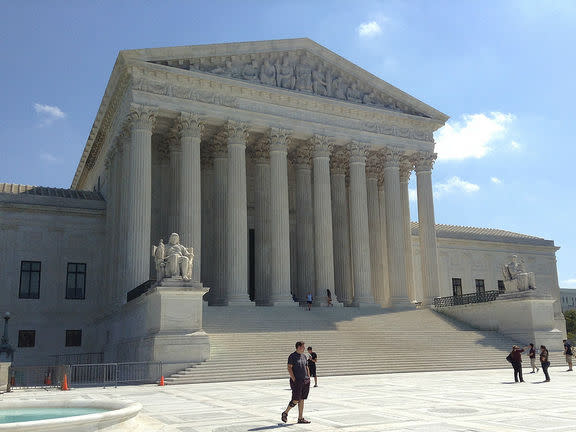Supreme Court set to hear cases on affirmative action and public unions

This week, the Supreme Court laid the groundwork to hear three controversial cases next term. Each case has the potential to upend constitutional law.
On Monday, the Court decided to rehear Fisher v. University of Texas after its second round in the lower courts—a case that examines the university’s affirmative action plan.
That same day, a stay was placed on the Fifth Circuit’s ruling in Whole Woman’s Health v. Cole, a case that challenges a Texas law requiring abortion providers to operate in “hospital-style surgical centers.” The Court is likely to accept the case in the coming months.
And on Tuesday, the Court took up Friedrichs v. California Teachers Association, in which the plaintiffs question the constitutionality of mandatory union dues for public school teachers.
After remanding Fisher in 2013 for review under strict scrutiny, the Court will consider again whether the university’s use of racial preferences in selecting new students is indeed constitutional. Past decisions in Regents of the University of California v. Bakke (1978) and Grutter v. Bollinger (2003) confirmed that, while specific quotas for minority groups were unconstitutional, race could be considered as part of an array of holistic factors in admissions decisions. While the Court does not appear poised to completely overturn these precedents, it may still limit their impact.
University of Texas applicant Abigail Fisher contends that the school’s discriminatory admission policies led to her rejection, even though her qualifications surpassed those of many admitted minority students. The university maintains a program by which the top 10 percent of students in each public graduating class are granted automatic admission; Fisher argues that this is enough to ensure diversity. (She narrowly missed the cut at Stephen F. Austin High School, finishing 82nd out of 674.)
In Freidrichs, the Court will consider the constitutionality of so-called “fair-share” payments, which were previously upheld in Abood v. Detroit Board of Education. This system is a compromise between free-speech and labor advocates, in which a union’s non-consenting members are required to pay for only the most basic tasks of representation, such as negotiating contracts. Under Abood, employees do not have to subsidize the political activities of the union, as that would amount to forced speech.
California teacher Rebecca Friedrichs, supported by the Center for Individual Rights, argues that she should have no obligation to pay any union dues whatsoever, since any payment is still a violation of her First Amendment right to free speech. Given the Court’s ruling last year in Harris v. Quinn—widely considered the forerunner to Friedrichs—the Justice are likely to split 5-4 once more.
Finally, if Whole Woman’s Health is indeed accepted, the Court will determine if the Texas requirement that abortions be performed at facilities with surgical-level equipment amounts to an unconstitutional violation of a woman’s right to an abortion.
In Planned Parenthood v. Casey (1992), the Court gave states some latitude in shaping abortion policy, but said that no law could place an “undue burden” on women to access the procedure. Already, 40 health clinics in Texas have closed due to the law; the Court’s ruling is likely to turn on how the majority defines and applies that “undue burden” standard.
The recent term ended with a bang, but next year is already shaping up to be just as exciting.
Will Field is an intern at the National Constitution Center.
Recent Stories on Constitution Daily
Chris Christie becomes 435th candidate to declare for 2016 election
Constitution Check: Is partisan gerrymandering beginning to get into legal trouble?
Supreme Court Scorecard (Updated June 29): The big decisions due this month

 Yahoo News
Yahoo News 
